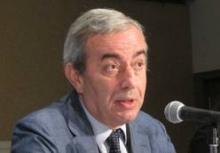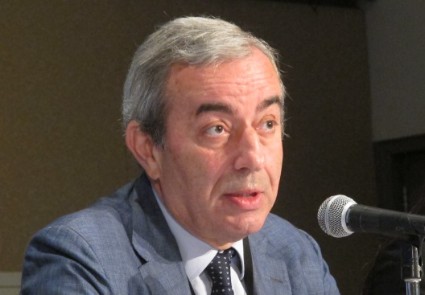User login
CHICAGO – The investigational drug lenvatinib significantly prolonged progression-free survival and produced high response rates compared with placebo in patients with iodine-refractory differentiated thyroid cancer.
In a randomized trial, the median progression-free survival (PFS) among patients assigned to lenvatinib was 18.3 months, compared with 3.6 months for placebo. The hazard ratio for lenvatinib was 0.21 (P less than .0001), Dr. Martin Schlumberger reported at the annual meeting of the American Society of Clinical Oncology.
"We had a high objective response rate – about 65% – with some complete responses. Interestingly, the time to objective response was only 2 months, so responses occur very quickly after the first treatment," Dr. Schlumberger, a professor of oncology at the University Paris-Sud, France, said at a media briefing prior to his presentation of the data in a plenary session.
"It’s really rewarding to see another active drug in this disease, where a year ago we really had no active therapy," commented Dr. Gregory A. Masters from the Helen F. Graham Cancer Center in Newark, Delaware.
Dr. Masters moderated the briefing but was not involved in the study.
Patients with relapsed or refractory differentiated thyroid cancer that is resistant to treatment with iodine-131 (131I) have few treatment choices and a 10-year survival rate of just 10%, Dr. Schlumberger noted.
There is evidence, however, showing that vascular endothelial growth factor (VEGF) signaling is associated with aggressive thyroid cancer and its propensity for metastasis, prompting researchers to explore VEGF-receptor inhibitors.
Lenvatinib is an oral multi–tyrosine kinase inhibitor of VEGF receptors 1-3, fibroblast growth factor receptors 1-4, platelet-derived growth factor receptor–alpha, and the RET and KIT kinases.
In a phase II study, the drug showed clinical activity against 131I-refractory differentiated thyroid cancer, prompting investigators to launch the phase III SELECT trial (Study of E7080 Lenvatinib in Differentiated Cancer of the Thyroid) in this population.
They enrolled 392 patients with measurable disease and evidence of progression within the previous 13 months of treatment, which could include one prior VEGF or VEGF-receptor inhibitor.
The patients were randomized on a 2:1 basis to either oral lenvatinib 24 mg daily or placebo, with treatment continuing until disease progression according to RECIST (Response Evaluation Criteria in Solid Tumor) criteria. At the time of confirmed disease progression, patients originally assigned to placebo could be crossed over to the active drug.
As noted above, median PFS was significantly better for the 261 patients assigned to lenvatinib, at 18.3 months, vs. 3.6 months for the 121 assigned to placebo. The median PFS for patients who had previously received another VEGF inhibitor was 15.1 months, compared with 18.7 months for those who had not been treated with an anti-VEGF agent (P value not shown). Median overall survival has not yet been reached.
The overall response rates were 65% for lenvatinib, versus 2% for placebo (P less than .0001). In the lenvatinib group, there were 4 complete responses, 165 partial responses, 40 cases with stable disease of at least 23 weeks’ duration, and 18 cases of progressive disease. Among placebo-treated patients, there were no complete responses, 2 partial responses, 39 cases of stable disease, and 52 of progressive disease. Only 1.5% of patients, all in the lenvatinib group, had a complete response, compared with none in the placebo group.
The median time to an objective response was 2 months. The median duration of response had not been reached by the last analysis. Approximately 75% of responders had an objective response last for more than 9.4 months, Dr. Schlumberger said.
As is common with other VEGF inhibitors, treatment-emergent adverse events were common, occurring in 97% of patients treated with lenvatinib, compared with 60% of patients on placebo.
The most common events were hypertension, occurring in 68% of patients vs. 9% on placebo, diarrhea (60% vs. 8%), fatigue/asthenia (59% vs. 28%), decreased appetite (50% vs. 12%), and nausea/vomiting (51% vs. 24%).
Adverse events requiring dose reductions occurred in 68% of patients on lenvatinib, dose interruptions in 82%, and discontinuation in 14%. In contrast, only 5% of patients on placebo had a dose reduction, 18% had an interruption, and 5% discontinued therapy.
Also of concern to investigators was the fact that of the 20 patients on lenvatinib who died during the trial, 6 of the deaths were determined by investigators to be treatment related. One of these patients died from a hemorrhagic stroke, one from a pulmonary embolism, and four from general health deterioration.
Hematologic complications are a class effect of the anti-VEGF tyrosine kinase inhibitors, said coauthor Dr. Lori Wirth, medical director of the center for head and neck cancers at Massachusetts General Hospital, Boston.
"The other thing about the toxicity profile overall is that it’s an extremely important thing to consider in patients with thyroid cancer, because many patients do have quite indolent disease. But the patients who were enrolled in the placebo arm had a progression-free survival of less than 4 months, and these are the people who go on to die from their disease when it’s that rapidly progressive. So we do need effective treatments that, unfortunately, do come with some toxicities," she said in an interview.
Although the toxicities of therapy were "considerable," most could be managed through either dose adjustment or additional medications, Dr. Schlumberger said.
The study was sponsored by Eisai. Dr. Schlumberger disclosed receiving honoraria and research funding and acting in an advisory role to the company. Dr. Masters and Dr. Wirth reported having no relevant relationships to disclose.
CHICAGO – The investigational drug lenvatinib significantly prolonged progression-free survival and produced high response rates compared with placebo in patients with iodine-refractory differentiated thyroid cancer.
In a randomized trial, the median progression-free survival (PFS) among patients assigned to lenvatinib was 18.3 months, compared with 3.6 months for placebo. The hazard ratio for lenvatinib was 0.21 (P less than .0001), Dr. Martin Schlumberger reported at the annual meeting of the American Society of Clinical Oncology.
"We had a high objective response rate – about 65% – with some complete responses. Interestingly, the time to objective response was only 2 months, so responses occur very quickly after the first treatment," Dr. Schlumberger, a professor of oncology at the University Paris-Sud, France, said at a media briefing prior to his presentation of the data in a plenary session.
"It’s really rewarding to see another active drug in this disease, where a year ago we really had no active therapy," commented Dr. Gregory A. Masters from the Helen F. Graham Cancer Center in Newark, Delaware.
Dr. Masters moderated the briefing but was not involved in the study.
Patients with relapsed or refractory differentiated thyroid cancer that is resistant to treatment with iodine-131 (131I) have few treatment choices and a 10-year survival rate of just 10%, Dr. Schlumberger noted.
There is evidence, however, showing that vascular endothelial growth factor (VEGF) signaling is associated with aggressive thyroid cancer and its propensity for metastasis, prompting researchers to explore VEGF-receptor inhibitors.
Lenvatinib is an oral multi–tyrosine kinase inhibitor of VEGF receptors 1-3, fibroblast growth factor receptors 1-4, platelet-derived growth factor receptor–alpha, and the RET and KIT kinases.
In a phase II study, the drug showed clinical activity against 131I-refractory differentiated thyroid cancer, prompting investigators to launch the phase III SELECT trial (Study of E7080 Lenvatinib in Differentiated Cancer of the Thyroid) in this population.
They enrolled 392 patients with measurable disease and evidence of progression within the previous 13 months of treatment, which could include one prior VEGF or VEGF-receptor inhibitor.
The patients were randomized on a 2:1 basis to either oral lenvatinib 24 mg daily or placebo, with treatment continuing until disease progression according to RECIST (Response Evaluation Criteria in Solid Tumor) criteria. At the time of confirmed disease progression, patients originally assigned to placebo could be crossed over to the active drug.
As noted above, median PFS was significantly better for the 261 patients assigned to lenvatinib, at 18.3 months, vs. 3.6 months for the 121 assigned to placebo. The median PFS for patients who had previously received another VEGF inhibitor was 15.1 months, compared with 18.7 months for those who had not been treated with an anti-VEGF agent (P value not shown). Median overall survival has not yet been reached.
The overall response rates were 65% for lenvatinib, versus 2% for placebo (P less than .0001). In the lenvatinib group, there were 4 complete responses, 165 partial responses, 40 cases with stable disease of at least 23 weeks’ duration, and 18 cases of progressive disease. Among placebo-treated patients, there were no complete responses, 2 partial responses, 39 cases of stable disease, and 52 of progressive disease. Only 1.5% of patients, all in the lenvatinib group, had a complete response, compared with none in the placebo group.
The median time to an objective response was 2 months. The median duration of response had not been reached by the last analysis. Approximately 75% of responders had an objective response last for more than 9.4 months, Dr. Schlumberger said.
As is common with other VEGF inhibitors, treatment-emergent adverse events were common, occurring in 97% of patients treated with lenvatinib, compared with 60% of patients on placebo.
The most common events were hypertension, occurring in 68% of patients vs. 9% on placebo, diarrhea (60% vs. 8%), fatigue/asthenia (59% vs. 28%), decreased appetite (50% vs. 12%), and nausea/vomiting (51% vs. 24%).
Adverse events requiring dose reductions occurred in 68% of patients on lenvatinib, dose interruptions in 82%, and discontinuation in 14%. In contrast, only 5% of patients on placebo had a dose reduction, 18% had an interruption, and 5% discontinued therapy.
Also of concern to investigators was the fact that of the 20 patients on lenvatinib who died during the trial, 6 of the deaths were determined by investigators to be treatment related. One of these patients died from a hemorrhagic stroke, one from a pulmonary embolism, and four from general health deterioration.
Hematologic complications are a class effect of the anti-VEGF tyrosine kinase inhibitors, said coauthor Dr. Lori Wirth, medical director of the center for head and neck cancers at Massachusetts General Hospital, Boston.
"The other thing about the toxicity profile overall is that it’s an extremely important thing to consider in patients with thyroid cancer, because many patients do have quite indolent disease. But the patients who were enrolled in the placebo arm had a progression-free survival of less than 4 months, and these are the people who go on to die from their disease when it’s that rapidly progressive. So we do need effective treatments that, unfortunately, do come with some toxicities," she said in an interview.
Although the toxicities of therapy were "considerable," most could be managed through either dose adjustment or additional medications, Dr. Schlumberger said.
The study was sponsored by Eisai. Dr. Schlumberger disclosed receiving honoraria and research funding and acting in an advisory role to the company. Dr. Masters and Dr. Wirth reported having no relevant relationships to disclose.
CHICAGO – The investigational drug lenvatinib significantly prolonged progression-free survival and produced high response rates compared with placebo in patients with iodine-refractory differentiated thyroid cancer.
In a randomized trial, the median progression-free survival (PFS) among patients assigned to lenvatinib was 18.3 months, compared with 3.6 months for placebo. The hazard ratio for lenvatinib was 0.21 (P less than .0001), Dr. Martin Schlumberger reported at the annual meeting of the American Society of Clinical Oncology.
"We had a high objective response rate – about 65% – with some complete responses. Interestingly, the time to objective response was only 2 months, so responses occur very quickly after the first treatment," Dr. Schlumberger, a professor of oncology at the University Paris-Sud, France, said at a media briefing prior to his presentation of the data in a plenary session.
"It’s really rewarding to see another active drug in this disease, where a year ago we really had no active therapy," commented Dr. Gregory A. Masters from the Helen F. Graham Cancer Center in Newark, Delaware.
Dr. Masters moderated the briefing but was not involved in the study.
Patients with relapsed or refractory differentiated thyroid cancer that is resistant to treatment with iodine-131 (131I) have few treatment choices and a 10-year survival rate of just 10%, Dr. Schlumberger noted.
There is evidence, however, showing that vascular endothelial growth factor (VEGF) signaling is associated with aggressive thyroid cancer and its propensity for metastasis, prompting researchers to explore VEGF-receptor inhibitors.
Lenvatinib is an oral multi–tyrosine kinase inhibitor of VEGF receptors 1-3, fibroblast growth factor receptors 1-4, platelet-derived growth factor receptor–alpha, and the RET and KIT kinases.
In a phase II study, the drug showed clinical activity against 131I-refractory differentiated thyroid cancer, prompting investigators to launch the phase III SELECT trial (Study of E7080 Lenvatinib in Differentiated Cancer of the Thyroid) in this population.
They enrolled 392 patients with measurable disease and evidence of progression within the previous 13 months of treatment, which could include one prior VEGF or VEGF-receptor inhibitor.
The patients were randomized on a 2:1 basis to either oral lenvatinib 24 mg daily or placebo, with treatment continuing until disease progression according to RECIST (Response Evaluation Criteria in Solid Tumor) criteria. At the time of confirmed disease progression, patients originally assigned to placebo could be crossed over to the active drug.
As noted above, median PFS was significantly better for the 261 patients assigned to lenvatinib, at 18.3 months, vs. 3.6 months for the 121 assigned to placebo. The median PFS for patients who had previously received another VEGF inhibitor was 15.1 months, compared with 18.7 months for those who had not been treated with an anti-VEGF agent (P value not shown). Median overall survival has not yet been reached.
The overall response rates were 65% for lenvatinib, versus 2% for placebo (P less than .0001). In the lenvatinib group, there were 4 complete responses, 165 partial responses, 40 cases with stable disease of at least 23 weeks’ duration, and 18 cases of progressive disease. Among placebo-treated patients, there were no complete responses, 2 partial responses, 39 cases of stable disease, and 52 of progressive disease. Only 1.5% of patients, all in the lenvatinib group, had a complete response, compared with none in the placebo group.
The median time to an objective response was 2 months. The median duration of response had not been reached by the last analysis. Approximately 75% of responders had an objective response last for more than 9.4 months, Dr. Schlumberger said.
As is common with other VEGF inhibitors, treatment-emergent adverse events were common, occurring in 97% of patients treated with lenvatinib, compared with 60% of patients on placebo.
The most common events were hypertension, occurring in 68% of patients vs. 9% on placebo, diarrhea (60% vs. 8%), fatigue/asthenia (59% vs. 28%), decreased appetite (50% vs. 12%), and nausea/vomiting (51% vs. 24%).
Adverse events requiring dose reductions occurred in 68% of patients on lenvatinib, dose interruptions in 82%, and discontinuation in 14%. In contrast, only 5% of patients on placebo had a dose reduction, 18% had an interruption, and 5% discontinued therapy.
Also of concern to investigators was the fact that of the 20 patients on lenvatinib who died during the trial, 6 of the deaths were determined by investigators to be treatment related. One of these patients died from a hemorrhagic stroke, one from a pulmonary embolism, and four from general health deterioration.
Hematologic complications are a class effect of the anti-VEGF tyrosine kinase inhibitors, said coauthor Dr. Lori Wirth, medical director of the center for head and neck cancers at Massachusetts General Hospital, Boston.
"The other thing about the toxicity profile overall is that it’s an extremely important thing to consider in patients with thyroid cancer, because many patients do have quite indolent disease. But the patients who were enrolled in the placebo arm had a progression-free survival of less than 4 months, and these are the people who go on to die from their disease when it’s that rapidly progressive. So we do need effective treatments that, unfortunately, do come with some toxicities," she said in an interview.
Although the toxicities of therapy were "considerable," most could be managed through either dose adjustment or additional medications, Dr. Schlumberger said.
The study was sponsored by Eisai. Dr. Schlumberger disclosed receiving honoraria and research funding and acting in an advisory role to the company. Dr. Masters and Dr. Wirth reported having no relevant relationships to disclose.
AT THE ASCO ANNUAL MEETING 2014
Key clinical finding: The investigational drug lenvatinib significantly prolonged progression-free survival and produced high response rates compared with placebo in patients with iodine-refractory differentiated thyroid cancer.
Major finding: Median progression-free survival for patients with relapsed iodine-refractory differentiated thyroid cancer was 18.3 months, compared with 3.6 months for patients on placebo.
Data source: Randomized, doubled-blind, placebo-controlled trial in 392 patients.
Disclosures: The study was sponsored by Eisai. Dr. Schlumberger disclosed receiving honoraria and research funding and acting in an advisory role to the company. Dr. Masters and Dr. Wirth reported having no relevant relationships to disclose.


